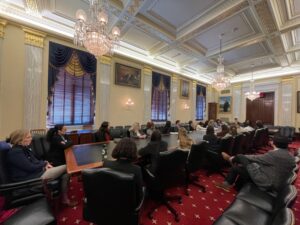This blog post was written by Brianna Johnson-King, J.D. ’21, a Fall 2019 clinic student of the Food Law & Policy Clinic.
I joined the Food Law & Policy Clinic to pursue my interest in the intersection of agriculture, the environment, and policy issues. My personal background growing up in Ohio exposed me to agriculture from an early age and has driven my attraction to this work. My semester at the clinic perfectly aligned with these interests and allowed me to analyze federal farm policies, specifically looking at ways to incorporate better environmental or climate-friendly strategies in the farm bill.
Congress passed the most recent farm bill in 2018, but future farm bills can and should go further to incorporate climate-friendly policies. This past fall, the House Select Committee on the Climate Crisis issued a Request for Information regarding climate change and industry responses. Two questions in this request focused on agriculture, such as policy proposals to reduce carbon pollution and other greenhouse gas emissions and maximize carbon storage in agriculture, as well as policies to help farmers, ranchers, and natural resource managers adapt to the impacts of climate change. We, as members of the Farm Bill Law Enterprise, submitted recommendations in response to these questions.
Overall, our recommendations focused on shifting to a perennial agricultural system, especially agroforestry, expanding conservation compliance, and reforming crop insurance. Agroforestry, whether executed by incorporating trees into pastures or cultivating side-by-side rows of trees with rows of non-woody plants, provides many benefits that annual crops do not. These include sequestering carbon, limiting soil erosion and run off, limiting fertilizer and pesticides, and more. Additionally, federal crop insurance impacts millions of acres and many producers. In 2017 alone, 1.12 million individual federal policies were issued¹. Congress should support climate-friendly practices by tying insurance premiums to actual planting risk, based in part on farmer planting practices and soil conditions.
I personally focused on the recommendation to expand conservation compliance, which is a requirement to receive payments from commodity programs and crop insurance. Currently, conservation compliance limits planting on highly erodible land without conservation plans and restricts planting on wetlands². These minimal requirements to comply with conservation measures do not protect the land from soil erosion, nor do they encourage climate-friendly practices. Congress should expand the requirements under conservation compliance by incorporating a list of verified climate mitigation practices. Producers would elect to implement a subset of these practices to meet conservation compliance. The Natural Resources Conservation Service (NRCS) would set the climate mitigation practices and might include cover cropping, perennial crops, buffer zones, agroforestry, conservation tillage, or drip irrigation.
Although expanding the definition of conservation compliance would promote use of climate-friendly practices, we also recommend that NRCS provide additional technical assistance to help farmers implement these practices and improve monitoring of farmers to ensure proper compliance. Given that many farmers could use these practices for the first time, it is essential that they receive support and guidance. Additionally, we recommended that NRCS improve monitoring procedures and change non-compliance penalty policies to ensure conservation compliance requirements are effective.
Agricultural can play a pivotal role in responding to climate change. Federal policies will have a widespread impact in encouraging a range of climate-friendly practices amongst all producers. My part in this recommendation allowed me to grasp the large role the farm bill plays in the agricultural sector and dig down into the details of how farm bill programs operate. The project offered a real-world opportunity to explore my agricultural, environmental, and policy interests, while developing new skills and knowledge in the process. It is exciting to see the House focus on these issues and I look forward to seeing what policies they recommend from their Request for Information.
¹ U.S. Dept. of Agric., Audit Report 05401-0010-11, Federal Crop Insurance Corporation/Risk Management Agency Financial Statements for Fiscal Years 2018 and 2017 Exhibit C 16 (2018).
² 2018 Farm Bill- Conservation Compliance Changes, U.S. Dep’t of Agric., Nat. Res. Conservation Serv., https://www.nrcs.usda.gov/wps/portal/nrcs/detail/national/programs/farmbill/?cid=stelprdb1257899 (last visited Oct. 9, 2019).
The views reflected in this blog are those of the individual authors and do not necessarily represent those of the Center for Health Law & Policy Innovation or Harvard Law School. This blog is solely informational in nature, and not intended as a substitute for competent legal advice from a licensed and retained attorney in your state or country.


Health Law & Policy, Commentary
Medicaid Section 1115 Waivers for Reentry: Updates and Resources – Health Care in Motion
April 17, 2024